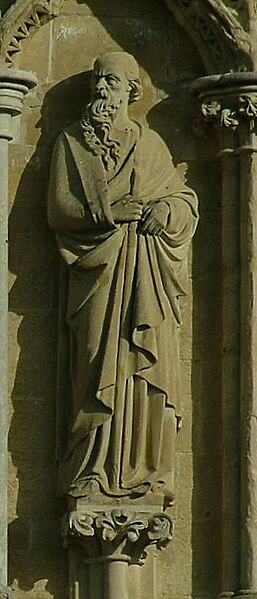Familiar With Strangers
Holy Trinity (B) (31 May 2015)
Homily of Fr. Paul Panaretos, S.J.
Words never capture God. We speak in images about God; and God is beyond all images. Scripture depicts God in various ways to help us imagine God vividly and personally. From soaring eagle1 to mother hen2 and comforting human mother3 to loving father4 the images help us appreciate qualities of God we may miss without them. Of these we are certain: God cares for us in ways beyond human parents; God creates us in the divine image.5 Let’s allow one image Jesus used for God to draw us closer to God.
From the lips of Jesus Abba became a Palestinian Christian address for God. They shouted it at baptism: those who came up from their triple immersion in water made holy by Jesus’ Spirit cried, Abba! Father! The phrase was not limited to the sacrament. Christians pronounced it as they were aware of all God’s gifts in Jesus by Holy Spirit.7
With ease flowing from shared sacramental worship, St. Paul used the phrase in his letter to the church at Rome. He did not establish the church thriving there. He wrote Roman Christians to ask them to support his travel to Spain, a missionary journey Paul longed to make: I hope to see you as I pass through and be helped on my way there by you, after I have enjoyed your company for a while.8 He wrote strangers; yet their shared tradition of word and sacrament made Jesus’ image of God familiar to Greek speaking Christians. Abba sealed Paul and Roman Christians into one family. The Christian family enjoys an inheritance: Jesus’ identity! Jesus’ Spirit…bears witness with our spirit that we are children of God. Inheriting Jesus’ identity, his Holy Spirit, makes us daughters and sons of God. We understand readily St. Paul’s word to describe God’s graciousness, adoption.
His closing point, though, may perplex: having Jesus’ identity includes suffering. Jesus…foretold we would share in the persecutions that brought [him] to a violent death.9 We may not suffer for sharing the faith of Jesus. Yet we are more aware than ever that many in our contemporary Christian family suffer intensely for their share of the faith of Jesus.10
Jesus suffered; God in Jesus suffered. The Author of life11 was killed so you and I may also be glorified with him. What does that mean for our Catholic living day to day? It means suffering, indeed any weakness, shapes us more like Jesus; it imprints Jesus’ identity on us most deeply. God became human in Jesus to serve and not to be served.12 Serving is an exercise of human freedom.
When Christians serve they donate their freedom as Jesus modeled. Holy Spirit, the identity of Jesus, animates us the more we: do not hide behind defenses; do not let our hearts grow cold and hard; do not put ourselves above others. Doing the opposite lets Holy Spirit work godly power through us: when we act sincerely not perfectly; when we act warmly, humanely; when we respect others as equals or even more deserving than ourselves. Acting in those ways is weak, foolish, even pathetic as the world measures human action. Jesus measured differently, according to the selflessness of his abba, his dear father. God’s Son gave us his Spirit so we may measure with his measure.13 Living our faith moment by moment opens us to welcome Jesus’ Spirit and express it with greater ease, vitality, freedom, familiarity and sincere affection.
In your daily 15 minutes with Jesus this week
- Rest in our triune God.
- Ask St. Paul and your patron saint to present you to Jesus.
- Chat with him: praise him for dying and rising for you; thank him for empowering you with his Spirit to make him known to the world.
- Ask him for grace to live more freely as his disciples, as children of his dear father.
- Close saying slowly the Lord’s Prayer. Each time we pray his prayer we let the voice of Jesus echo with our voices. His words guide Catholic living; his Spirit frees our freedom and lets our smallest actions embody his compassion and love.
Link to this homily’s Spiritual Exercise
____________
- Exodus 19.4; Deuteronomy 32.11.
- Matthew 23.37 || Luke 13.34.
- Isaiah 66.13.
- Deuteronomy 32.6; Isaiah 63.16; Jeremiah 31.9.
- Genesis 1.26.
- Mark 14.36: and this before his suffering and death!
- Wayne Meeks, The First Urban Christians: The Social World of the Apostle Paul (New Haven: Yale University Press, 1983), pp. 152-56.
- Romans 15.24.
- Psalm Prayer, Office of Readings, Week IV, Thursday, Liturgy of the Hours.
- John L. Allen Jr., The Global War on Christians: Dispatches from the Front Lines of Anti-Christian Persecution (NY: Image, 2013). Necessary reading and painful. Its Amazon site offers an excerpt.
- Acts 3.15.
- Matthew 20.28; Mark 10.45.
- Matthew 7.2; Mark 4.24; Luke 6.38.
____________
Wiki-images: Dogmatic sarcaphogus PD-Release Shamrock by Accuruss CC BY-SA 4.0




.jpg/800px-Acts_of_the_Apostles_Chapter_10-2_(Bible_Illustrations_by_Sweet_Media).jpg)

_-_James_Tissot.jpg/744px-Brooklyn_Museum_-_The_Last_Sermon_of_Our_Lord_(Dernier_Sermon_de_Notre-Seigneur)_-_James_Tissot.jpg)
